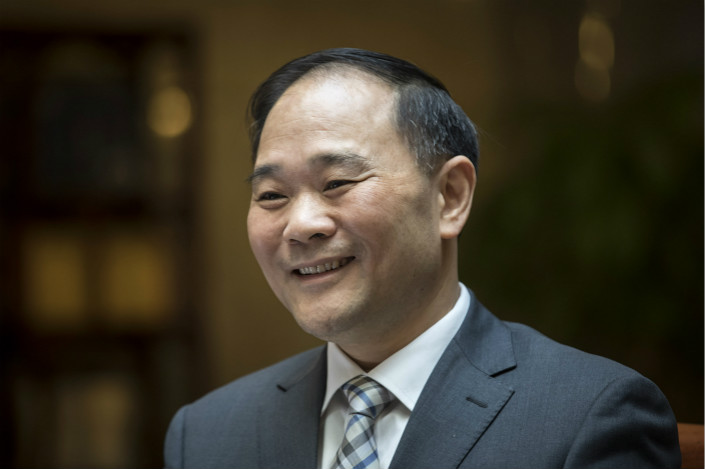Geely’s Li Calls for Auto-Industry Cooperation in Technology

The billionaire founder of China’s largest private automaker, whose investment portfolio includes Daimler, Volvo and Lotus Cars, has called on the industry to collaborate closely amid the rise of new technologies such as autonomous driving.
“We must actively explore the possibility of extensive alliances instead of evading reality and becoming introspective,” said Li Shufu, chairman of Zhejiang Geely Holding Group Co. Ltd. “We must offer new technologies in ways that promise a return on investment.”
Li, who in February became the single largest stakeholder in German carmaker Daimler AG, made the remarks in an editorial in the German newspaper Frankfurter Allgemeine Zeitung over the weekend.
Li said he wrote the article before the world’s major automakers converge in China later this month for the 15th Beijing International Automotive Exhibition. The theme “Steering to a New Era” reflects the challenge facing the whole industry, he said, adding that carmakers must adjust to an era of technological disruption, tougher regulations and changing ownership patterns.
The 55-year-old emphasized that there are “long-standing possibilities” to explore market-oriented partnerships and cooperation.
“If a potential partnership meets legal and regulatory requirements, all bilateral and multilateral mutual benefits can and should be discussed. This is one of the powerful attractions of the market economy, with its openness toward shared strategic innovation,” he said.
But Liu said Chinese brands need to think beyond their own borders, as Chinese growth is not a panacea for the rest of the industry.
The opinion piece was widely interpreted in German media as a sign that the new Daimler shareholder “would play an active role in shaping the company's future,” according to a report by China’s official Xinhua News Agency.
Founded in 1997 in Hangzhou as China’s first private automaker, Geely has driven into a global path of acquisitions. It spent $1.8 billion to buy out U.S. automaker Ford Motor Co.’s Volvo unit in 2010, a move emblematic of the shift in the global car industry to China from the U.S. and western Europe.
The Hangzhou-based carmaker later acquired the iconic London Taxi Co. in 2013, and then began producing the first electric black cabs from a new plant in Britain.
Last year, it purchased various stakes in automakers around the globe, including Malaysia’s Proton Holdings Berhad, British sports and racing car manufacturer Lotus Cars, and Sweden’s AB Volvo.
Contact reporter Jason Tan (jasontan@caixin.com)

- 1China Officials Dismiss Tax Hike Rumors After Tech Selloff
- 2Cover Story: How Gutter Oil Became a Prized Fuel for International Airlines
- 3Maersk Unit Takes Over CK Hutchison Panama Ports After Court Ruling
- 4Prominent Chinese Journalist Liu Hu Detained by Police in Chengdu
- 5China Provinces Set Cautious 2026 Growth Targets
- 1Power To The People: Pintec Serves A Booming Consumer Class
- 2Largest hotel group in Europe accepts UnionPay
- 3UnionPay mobile QuickPass debuts in Hong Kong
- 4UnionPay International launches premium catering privilege U Dining Collection
- 5UnionPay International’s U Plan has covered over 1600 stores overseas





